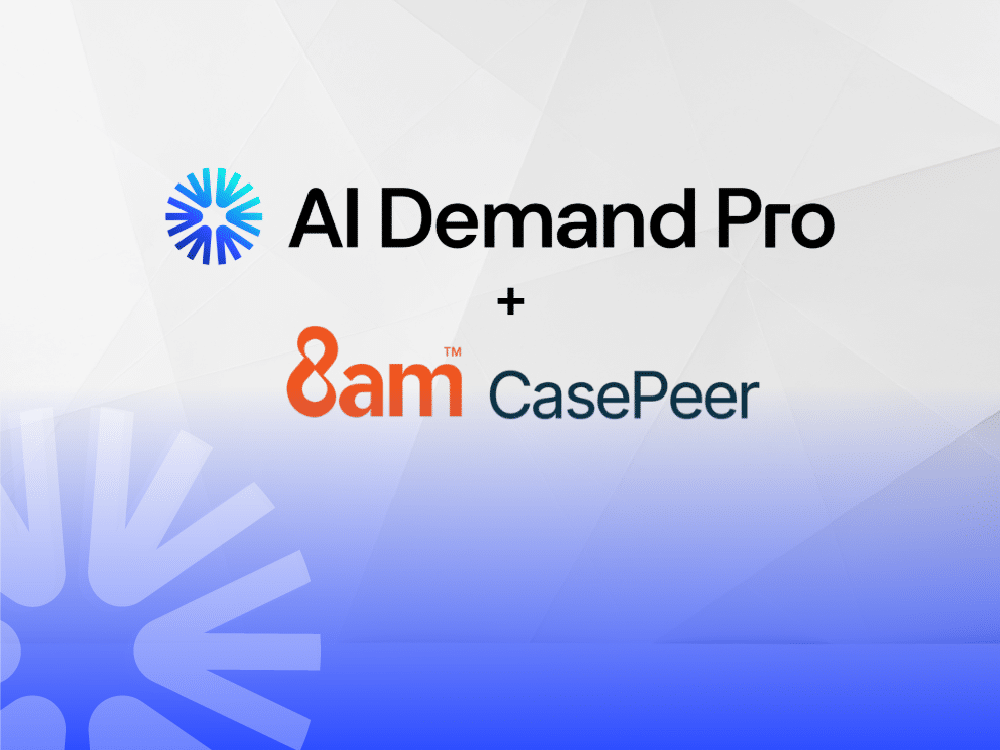Blog >
4 Ways AI-Generated Personal Injury Settlement Demands Can Help Law Firms

In this blog
Personal injury law firms know firsthand the struggle of producing high-quality settlement demands. In their quest to ensure that victims receive fair compensation, law firms go to great lengths to find and retain skilled demand writers.
Unfortunately, many writers struggle to extract and synthesize key details from complex or voluminous medical and legal records. Meanwhile, it can take from two days up to two weeks for demand writers to produce a draft due to the volume of medical records. Furthermore, many 3rd-party demand writing services charge based on the volume of medical records and number of pages that need to be reviewed. In a worst-case scenario, writers may charge such excessively high fees that law firms cannot reasonably justify passing the full costs to their client.
Fortunately, as a result of advances in AI, law firms don’t have to rely solely on human demand writers anymore. Over the past few years, experienced personal injury attorneys have been training AI tools to generate salient, powerful drafts of settlement demands. The best of these tools can rapidly analyze police reports, medical records, and bills, then synthesize comprehensive, compelling narrative-style settlement demand drafts. Best of all, these drafts can be produced cost-effectively and in a matter of minutes—no matter the volume of source material that may be associated with a particular case.
Let’s explore four key ways that AI-generated personal injury settlement demands can become an invaluable asset to law firms.
Drastically Reduce Turnaround Time
It is not uncommon for demand writers to take multiple weeks to turn around a single demand draft. Even for basic cases that involve a single medical provider, the average turnaround time can be two to three days.
AI bypasses this bottleneck entirely by leveraging advanced machine learning (ML) and natural language processing (NLP) to analyze documents quickly and at scale. By analyzing police reports, medical records, and billing information in minutes, AI-powered tools generate clear, comprehensive demand drafts far faster than traditional methods. This speed allows law firms to keep cases moving, respond to opportunities more quickly, and serve clients with greater efficiency—without sacrificing quality or impact.
Free Up Your Legal Team for Higher-Value Work
Law firms spend extensive time finding, training, and providing ongoing support to their demand writers. When demand writers produce subpar work, it forces law firms to spend even more time cleaning up the work of their writers.
AI eliminates the need for law firms to recruit and retain a demand-writing team, which frees up lawyers, paralegals, and assistants to focus on higher-value work that AI cannot perform.
Ensure Consistent, High-Quality Drafts Every Time
Many demand writers struggle with quality and accuracy, especially when a case requires that they review and extract pertinent information from multiple sets of medical and legal records. Writers can make factual mistakes, overlook relevant details, and develop less-than-compelling narratives.
AI eliminates this unevenness by offering a predictable level of quality and consistency. The best AI tools are custom-built to tap into vast legal resources and retrieve appropriate, relevant, and accurate data-driven insights. While lawyers should still carefully review AI-generated drafts, law firms can count on a much lighter workload, as every AI-generated demand draft will be consistently high quality.
Keep Client Data Secure
The pop-culture image of AI is that it’s an open-access tool operating in a Wild West environment. But AI for drafting settlement demands is a highly specialized type of AI that is for the sole use of law firms specializing in personal injury cases. This form of AI is both secure and compliant with data privacy standards, with safeguards in place to ensure that confidential client information is redacted before AI gains access to it. Moreover, AI-powered demand writing can be readily and seamlessly integrated into a law firm’s existing workflows and practices.
The Future of Demand Writing Is AI
When law firms make the transition from human demand writers to an AI-powered equivalent, they can expect to save time and money, free up their staff’s time to focus on higher-value work, produce consistently high-quality drafts of demands, and seamlessly integrate a secure, compliant AI-powered platform into the firm’s workflows.
Given the advantages of AI, the question for law firms is not if they should make the transition but rather which AI platform or service they should use. Not all AI-powered platforms and services are created equal. Some AI services overpromise and underdeliver, while others use AI on a limited basis only and still rely on human demand writers and paralegals.
AI Demand Pro is proud to lead the way in helping personal injury firms transition to AI-powered settlement demand writing. We’ve put together an in-depth comparison chart highlighting what sets us apart from our competition, and we invite you to contact us to learn more about AI-powered demand writing, how AI Demand Pro can be a key asset to your firm, and see a live demo of how our technology can compose a complete AI-generated settlement demand from hundreds of pages of medical records and other documentation in just 15 minutes.
Check Out Other Blogs
6 Questions to Ask Before Buying Legal AI Software
In this blog, we’ll review the questions that every legal firm should ask before purchasing any legal AI software. Use it as your checklist for demos, RFPs, and vendor meetings so you can feel confident you’re choosing legal AI that truly fits your practice.
How Secure Is Your Legal AI? What PI Attorneys Must Know About Data Protection
In this blog, we’ll break down the critical considerations every personal injury attorney should understand when assessing data protection for lawyers.
AI Demand Pro Integration Launches with CasePeer to Streamline PI Demand Drafting
AI Demand Pro now integrates with CasePeer, helping personal injury firms draft demand letters faster and streamline case workflows with attorney-level precision.
Partner with AI Demand Pro for Better, Faster Demands
Are you struggling with long drafting processes, settlement demand bottlenecks, demand quality and accuracy issues, and/or staff turnover? AI Demand Pro can help with all of these issues. Schedule a demo with a member of our team and watch a live demo of how quickly you can create better, faster, stronger personal injury settlement demands in minutes.



